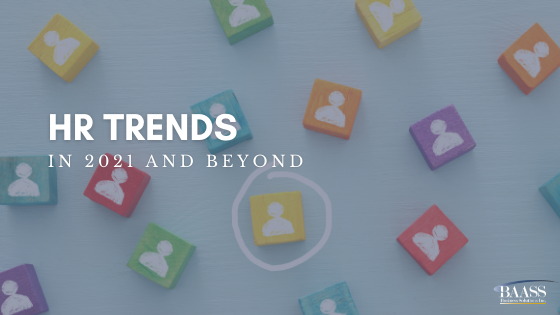
With the many changes in 2020 and 2021, human resources along with other departments have needed to adapt and pivot best practices in order to remain efficient and successful. Although the business landscape continues to change and it can be difficult to know what will happen next, it is important to acknowledge trends and predictions. In this blog, we will discuss 10 human resources trends and what is predicted to continue throughout the rest of 2021 and beyond.
1. Working from Home
The sudden jump to working remotely left little to no choice for employers. At first, many found this change difficult and uncomfortable. With no choice other than to evolve, the adoption of communication tools and solutions gained importance. These tools have allowed organizations to simplify processes and collaboration and in many cases improve overall efficiency.
With the possibility to stay remote or hybrid for the foreseeable future, it is important to ensure the technology and processes used will remain competitive and successful for years to come. Although working from home may not be implemented long term for every company, we believe that technological accessibility will hold high importance and remain part of how we work.
2. Pivoting HR
Human resources as a whole have had to encounter a major switch in the way the department is run on a day-to-day basis. Employee management, completing tasks as well as the onboarding process have seen various obstacles. HR must continue to reinvent current practices to effectively deal with these situations in a digital world.
Employee engagement and management have become a large challenge for HR leaders due to remote working. It can be difficult to maintain company culture and create a work environment for employees from a digital standpoint. Fortunately, the many tools available such as Zoom, Microsoft Teams, Go-To-Meeting and more help to improve the management of employees and data. It is important to have open communication throughout an organization to visibility and room for growth within your team.
3. Reinventing the employee experience
How employees feel while working for a company is directly related to their desire to succeed, productivity, and eagerness to grow. The onboarding process looked very different in the past. We often saw that when new employees were introduced to new team members and environments, there was a high level of social interaction which made for a warm welcome. Now, employees are introduced to a virtual environment which can make individuals feel much more disconnected from their new team and atmosphere.
It is important for the HR department to work on redesigning the employee journey and measure experiences for feedback. Elements like work-life balance, wellbeing, connection, and collaboration are crucial both for employee satisfaction and the optimization of business outcomes.
Focusing on organizational culture through activities like trivia days, company-wide meetings, or lunch and learns can help to bring employees together and feel more connected while working remotely. It also can bring a sense of excitement or something to look forward to when lacking the social interactions, engagements and experiences in a remote workforce.
4. Generational Differences
Each generation is said to hold different priorities and desires when it comes to what they look for and value within a role, but research has shown that these perennials do not have as big of an impact as believed. A study by Deloitte shares the shrinking gap in generational differences related to work.
For employees to feel fulfilled, they often will look for purpose, good management, professional growth, and feeling valued. Employee reviews are common in companies, however, they are not completed regularly. Showing employees how much the company appreciates, respects and values them on a personal level is gratifying – and often overlooked.
5. Employee training
The desire and need to upskill is continuously on the rise, employee training benefits both the employer and the employee. Training is a way to take initiative, gain valuable information, and accomplish goals. Training included in the onboarding process can help to ensure all employees are aware of processes, values, regulations, and more. Training may also help employees to feel more connected to their role and team members with a sense of value and belonging in a digital world.
There are various types of training that HR professionals can implement to help prepare for the future, including:
- Orientation
- Onboarding
- Technical skills development
- Soft skills development
- Products and services training
- Quality training
- Safety training
- Team training
6. Leading with HR
With 2020 altering the world’s dynamic, employees have increased concern about not only themselves but their family and friends. Within a workplace, the human resources department is where individuals confide. HR departments of many organizations have been on the frontline, facilitating employees, recruiting/onboarding employees, and handling business needs. All while managing concerns and questions of their employees, supporting them, and focusing on people’s mental health and wellbeing.
There have been various offerings from the government and workplace to help individuals navigate through these difficult times. It is important that the HR department is aware of these offerings and the frequently asked questions to follow, in order to prepare for now and the future workplace moving forward.
7. Self-Serve
With the innovation of technology and the world continuously moving to a digital age for both employees and customer service, self-serve has gained increasing importance. Going paperless and moving to automation helps businesses to become more data-driven and secure. The technology available can significantly assist the HR department in managing and organizing tasks like turnover, onboarding, vacation time etc.
With the transformation of things like artificial intelligence (AI), the internet of things (IoT), business intelligence (BI) and chat boxes it is important to adapt these trending and innovative ways to do business in a more efficient and effective way. With customers and employees looking for an answer quickly and correctly these elements can help to improve their experience through simple self-serve attributes.
8. Employee ownership
Working from home employees have a lot of freedom to make their workspace what they desire. Although funds can be offered from an employer they do not have full control over how an employee decides to complete their roles on a day-to-day basis. It is strongly believed that giving employees room to take ownership of their roles will be essential for job satisfaction and productivity in 2021 and beyond, boosting both employee and organizational success.
9. Utilizing analytics
Business and people analytics help an HR department to know what and who is running smoothly and what may need improvement moving forward. Employee productivity holds high importance along with their satisfaction. Although people analytics are being utilized by many businesses, the impact of their findings is often still lacking.
Key performance indicators (KPIs) can help to analyze HR and its effectiveness, here are a few analytics to take a look at:
- Absenteeism Rate
- Overtime Hours
- Training Costs
- Employee Productivity
- Talent Satisfaction
- Cost per Hire
- Recruiting Conversion Rate
- Time to Fill
- Talent Rating
- Employee Turnover Rate
- Talent Turnover Rate
- Dismissal Rate
- Female to Male Ratio
- Average Time Stay
10. Importance of purpose
According to the study “Putting Purpose to Work” by PwC, it is said that 79% of business leaders believe that purpose is the key to success. In order to be a purpose-driven organization, it is important to take into consideration the challenges of motivation and burnouts that remote workers may increasingly face. Communicating business and role purpose, as well as feedback helps to motivate employees to feel part of a change.
Conclusion
With the business landscape and technology continuously evolving, it is vital for businesses and employees to adapt and pivot their roles to ensure success. HR professionals have a large impact on the workplace environment, communication, openness, fulfillment and more. Taking into consideration the trends mentioned above will help your business to move forward for now and in the future.
